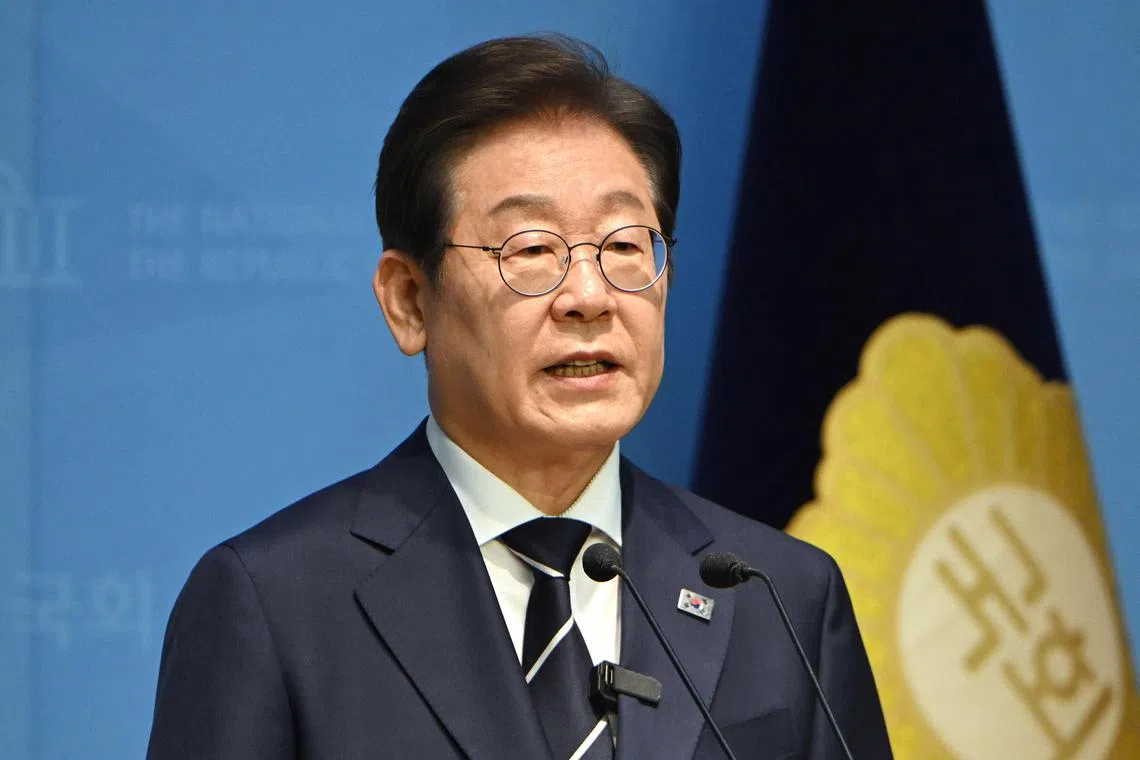South Koreans’ support for liberal Lee Jae-myung rises ahead of election
Sign up now: Get ST's newsletters delivered to your inbox

The latest Gallup Poll released on April 11 showed that the left-leaning Lee Jae-myung's support has risen to 37 per cent.
PHOTO: AFP
Follow topic:
Support for South Korea’s presidential race front runner Lee Jae-myung has risen to a three-month high as he extends his lead over conservative candidates, in a sign the opposition Democratic Party (DP) could grab power in nationwide polls on June 3.
The latest Gallup poll released on April 11 showed that the left-leaning Mr Lee’s support has risen to 37 per cent, up 3 percentage points from last week’s survey.
It was the first poll conducted since former president Yoon Suk Yeol was removed from office over his martial law gamble
The poll was conducted among 1,005 respondents across the country and had a margin of error of plus or minus 3.1 percentage points.
Yoon’s dismissal gives liberal candidates a relative advantage in the next election, potentially setting the stage for a shift towards more progressive economic and social policies.
Financial markets are eagerly waiting for a new government to take charge and help restore the economy after Yoon’s abrupt martial law decree weighed on growth prospects.
South Korea’s leadership crisis has also weakened the export-oriented economy’s ability to effectively deal with US President Donald Trump’s tariffs.
The incoming leader will face the challenge of integrating a deeply divided nation, shoring up an economy increasingly strained by the intensifying trade war and countering North Korea’s growing assertiveness.
If elected, Mr Lee will likely see limited resistance from Parliament to implement his reform agenda, at least for the first half of the single, five-year term, as the DP holds a commanding majority in the National Assembly.
Mr Lee is a vocal advocate of a universal basic income, though he has refrained from raising the issue as of late, instead pledging to focus more on growth in what appears to be an attempt to attract swing voters.
Asked on April 11 how his policy vision has changed from that during the 2022 presidential campaign when he lost to Yoon by a wafer-thin margin, Mr Lee said his focus has tilted from fairness to growth.
Still, his key initiatives centre on wealth redistribution through active state intervention.
“Our society has more resources than before as a whole, but, when you look individually, it is too concentrated in one place,” he said in a video released on April 10, declaring his bid for candidacy
Conservative candidates have been neck and neck in polls for months with Mr Kim Moon-soo, who served as labour minister under Yoon, leading with a support of 9 per cent.
Other candidates seeking to represent PPP include former Daegu mayor Hong Joon-pyo, who unsuccessfully ran in a 2017 vote, Seoul Mayor Oh Se-hoon and Mr Han Dong-hoon, a former PPP leader who served as justice minister under Yoon.
The PPP is set to hold a primary on May 3 to pick its flag-bearer.
The latest Gallup poll showed that the economy is at the top of voters’ minds, with 48 per cent of respondents saying that revitalising growth should be the next president’s top priority, followed by those calling for integration of the divided nation at 13 per cent.
On foreign policy, Mr Lee is likely to pursue a more conciliatory line with North Korea and push for more balanced ties with both the US and China.
He has toned down his stance on Japan, after previously accusing it of showing too little contrition for occupying Korea in the early 20th century. BLOOMBERG

